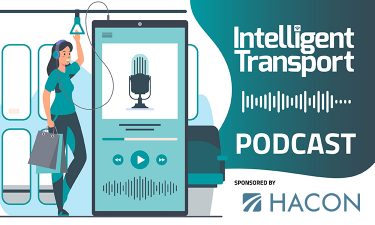¡Desconecta con la aplicación Player FM !
Intelligent Transport Podcast Episode 15 – Thomas Wolf, Hacon
Manage episode 373977145 series 3501844

We begin this episode by considering why it is so important that Mobility-as-a-Service (MaaS) is delivered both successfully and globally, and how the concept can benefit both passengers and the public transport industry. Thomas also shares his thoughts on how successful MaaS initiatives can support modal shift from private car use and ownership, particularly as the industry looks to avoid a car-led recovery post-pandemic.
Technology is undeniably a driver of the delivery of MaaS and, here, Thomas explains which technological innovations – in areas such as journey planning and ticketing – are supporting the development of MaaS and highlights how Hacon can support the industry in these areas. Additionally, Thomas points out that it is not just technology that is supporting the delivery of Mobility-as-a-Service, but explains that other factors such as business models and regulatory frameworks are just as significant.
Then, in the second half of the episode, we delve deeper into some of the key features of MaaS – such as multimodality and Demand-Responsive Transport (DRT) – and consider whether or not DRT acts as a booster of MaaS or if it is the other way around, as well as discuss how effective MaaS solutions have the potential to adapt to and encourage the sustainable recovery of business travel.
 Thomas Wolf has been supporting the Hacon management team as Chief Operating Officer HAFAS since 2016. With diplomas in Computer Engineering and Business Economics, he started his career at Hewlett Packard, followed by a COO position at Höft & Wessel AG. Prior to joining Hacon, Thomas served as COO for INIT Inc., operating out of Seattle, Washington. Headquartered in Hanover, Germany, Hacon provides cutting-edge software solutions for public transportation, mobility and logistics.
Thomas Wolf has been supporting the Hacon management team as Chief Operating Officer HAFAS since 2016. With diplomas in Computer Engineering and Business Economics, he started his career at Hewlett Packard, followed by a COO position at Höft & Wessel AG. Prior to joining Hacon, Thomas served as COO for INIT Inc., operating out of Seattle, Washington. Headquartered in Hanover, Germany, Hacon provides cutting-edge software solutions for public transportation, mobility and logistics.
31 episodios
Manage episode 373977145 series 3501844

We begin this episode by considering why it is so important that Mobility-as-a-Service (MaaS) is delivered both successfully and globally, and how the concept can benefit both passengers and the public transport industry. Thomas also shares his thoughts on how successful MaaS initiatives can support modal shift from private car use and ownership, particularly as the industry looks to avoid a car-led recovery post-pandemic.
Technology is undeniably a driver of the delivery of MaaS and, here, Thomas explains which technological innovations – in areas such as journey planning and ticketing – are supporting the development of MaaS and highlights how Hacon can support the industry in these areas. Additionally, Thomas points out that it is not just technology that is supporting the delivery of Mobility-as-a-Service, but explains that other factors such as business models and regulatory frameworks are just as significant.
Then, in the second half of the episode, we delve deeper into some of the key features of MaaS – such as multimodality and Demand-Responsive Transport (DRT) – and consider whether or not DRT acts as a booster of MaaS or if it is the other way around, as well as discuss how effective MaaS solutions have the potential to adapt to and encourage the sustainable recovery of business travel.
 Thomas Wolf has been supporting the Hacon management team as Chief Operating Officer HAFAS since 2016. With diplomas in Computer Engineering and Business Economics, he started his career at Hewlett Packard, followed by a COO position at Höft & Wessel AG. Prior to joining Hacon, Thomas served as COO for INIT Inc., operating out of Seattle, Washington. Headquartered in Hanover, Germany, Hacon provides cutting-edge software solutions for public transportation, mobility and logistics.
Thomas Wolf has been supporting the Hacon management team as Chief Operating Officer HAFAS since 2016. With diplomas in Computer Engineering and Business Economics, he started his career at Hewlett Packard, followed by a COO position at Höft & Wessel AG. Prior to joining Hacon, Thomas served as COO for INIT Inc., operating out of Seattle, Washington. Headquartered in Hanover, Germany, Hacon provides cutting-edge software solutions for public transportation, mobility and logistics.
31 episodios
Tất cả các tập
×Bienvenido a Player FM!
Player FM está escaneando la web en busca de podcasts de alta calidad para que los disfrutes en este momento. Es la mejor aplicación de podcast y funciona en Android, iPhone y la web. Regístrate para sincronizar suscripciones a través de dispositivos.




